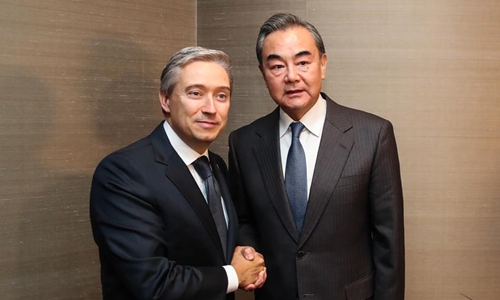HOME >> OPINION
Canada puts aside diplomatic strains to help China fight coronavirus
By Liu Dan Source:Global Times Published: 2020/2/16 14:42:15

Chinese State Councilor and Foreign Minister Wang Yi (right) meets with Canadian Foreign Minister Francois-Philippe Champagne in Munich, Germany, on Friday. Photo: Xinhua
The novel coronavirus pneumonia (NCP) that broke out in Wuhan, Central China's Hubei Province in December 2019 has affected many countries and regions.
Since the World Health Organization (WHO) declared the outbreak of coronavirus a public health emergency of international concern, the US took the lead in adopting extreme policies against China and announced restrictions on entry to the US for travelers from China.
On one hand, the move created panic in the international community; on the other, it also sent the wrong message which some countries have followed.
In addition, some US officials and media have also made unfriendly even vicious comments about China. For example, US Commerce Secretary Wilbur Ross said the coronavirus would "help to accelerate" the return of jobs to the US. The Wall Street Journal even published an opinion article titled "China is the Real Sick Man of Asia."
Compared with the US, Canada's attitude is just the opposite. Both the Canadian government and the people have shown the country's fraternity and friendliness during the epidemic.
When the US and some other countries shut their doors to China, Canada, instead of following the US suit, reached out to help China by providing a lot of assistance in terms of personnel and material.
Since February 4, Canada has provided China with 16 tons of protective equipment including facial masks, goggles and gloves. On February 10, an advance team led by Canadian epidemiologist and emergencies expert Dr Bruce Aylward arrived in Beijing.
The Canadian government is highly concerned about the epidemic in China and has offered assistance, as Canadian Prime Minister Justin Trudeau said on February 9 during a news conference, "We are going to continue to work with them to ensure that they have the resources to contain this virus.".
Dominic Barton, the Canadian Ambassador to China, wrote in Chinese characters and English to cheer for Wuhan, "You are not alone!"
Canadian companies and organizations in China have also provided assistance. For example, Canada Wellness Institute, joining hands with Healthy Wuhan, an application supported by the city's Health and Family Planning Commission, donated 2 million yuan ($286,422) worth of household medical equipment, which allows Wuhan citizens to monitor their health conditions at home and reduces the risk of cross-infection at hospitals to a certain extent. Meanwhile, the institute has also launched several online services, including psychological counseling.
Although China-Canada ties are strained due to the arrest of Huawei chief financial officer Meng Wanzhou, as well as the 5G issue, Ottawa has adopted an attitude completely different to that of Washington amid the coronavirus epidemic. In the face of a disaster, a country's behavior is not entirely dominated by its diplomatic relations; values that the country pursues are a more important factor.
Since US President Donald Trump assumed office, his administration has been advocating "America First." The US has not hesitated to benefit itself at the expenses of others. Trudeau, however, has emphasized multilateralism in engaging in international affairs since he was first elected in 2015. Opinion polls during the previous two elections also showed that the Canadian people attach importance to international affairs and international contribution.
It is true that certain problems still remain unresolved between China and Canada, and some disharmonious voices exist inside Ottawa. But the Trudeau administration has tried to conduct effective communication with China in the past months.
For example, Ottawa appointed Barton as ambassador to China and François-Philippe Champagne as the Federal Minister of Foreign Affairs. Both of them are experienced in dealing with China affairs. And Canadian officials in May 2019 welcomed the opportunity to work with China in the Arctic. All these have demonstrated Canada's efforts to pursue an independent foreign policy.
Although Canada still faces pressure from the US and other members of the Five Eyes alliance, this partnership is not monolithic, which can be seen from the UK's acceptance of Huawei to build its 5G network. It is believed that each country of the alliance will ultimately make a wise choice in line with its own national interests.
Canada's support for China amid the coronavirus outbreak has shown its goodwill. It is hoped that Ottawa can make further efforts for a truly independent foreign policy, including dealing with the Huawei issue and the Meng case, so as to mend its ties with China soon.
The author is a research fellow with the Center for Canadian Studies, Guangdong University of Foreign Studies. opinion@globaltimes.com.cn
Posted in: VIEWPOINT